Body dysmorphia is an obsessive-compulsive disorder characterized by excessive thoughts about a specific part of the body, or a physical defect, usually minor or imagined, which causes extreme anxiety.
This disorder can cause great distress and become more severe over time if left untreated.
In this article, we’ve looked at how to find a body dysmorphic disorder therapist, in-person and online, explained what body dysmorphic disorder is, and looked at which types of therapies are most effective in its treatment.
Want to skip right to the suggestions for body dysmorphia therapists? Here are our 6 recommended therapy solutions:
- BetterHelp
- Teen Counseling
- Find-a-therapist.com
- Online-therapy.com
- TalkSpace
- International OCD Foundation
Body Dysmorphia Therapists Near Me
Here are six of the best places to find a body dysmorphic disorder therapist near you or online, considering it could be challenging to find a specialized therapist in your area.
| Povider | Good For | Location | Pricing |
|---|---|---|---|
| BetterHelp | Quick match with the right therapist for you | Online therapy | $65 to $90 per week (billed every 4 weeks) |
| Teen Counseling | Teens from ages 13-19 | Online therapy | $65 to $90 per week (billed every 4 weeks) |
| Find-a-therapist.com | Finding and contacting the right therapist for you | Online and in-person therapy | Varies depending on the counselor fee |
| Online-therapy.com | Finding licensed and experienced therapists with a Cognitive Behavioral Therapy (CBT) approach | Online therapy | $40/week to $88/week (including our 20% discount first month) |
| TalkSpace | Depression, anxiety, bipolar disorder, OCD, PTSD, LGBTQIA+ therapy | Online therapy | Varies according to insurance coverage or self-pay options |
| International OCD Foundation | Finding the right body dysmorphia therapist for you | Online and in-person therapy | Varies depending on the counselor fee |
1. BetterHelp
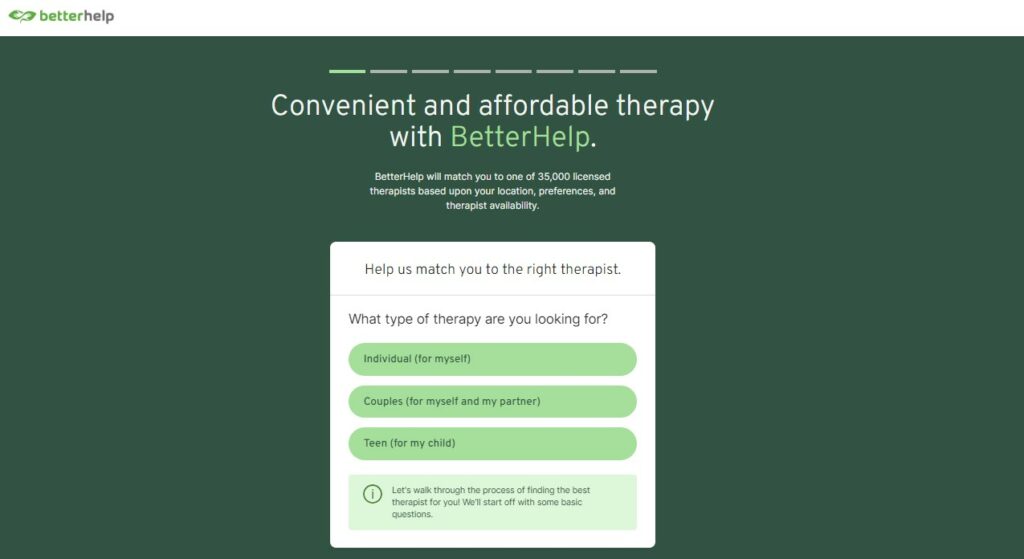
Explore emotional well-being with BetterHelp – your partner in affordable online therapy. With 30,000+ licensed therapists and plans starting from only $65 per week, BetterHelp makes self-care accessible to all. Complete the questionnaire to match with the right therapist.
- Good for: Quick match with the right therapist for you.
- Location: Online therapy.
- Pricing: $65 to $90 per week (billed every 4 weeks).
- Features: iOS and Android app available, message your therapist anytime, live sessions are scheduled weekly and done via live chat, phone, or video call.
BetterHelp is an online platform that connects you with qualified mental health professionals. All of the therapists on this platform are licensed, experienced professionals who specialize in providing different types of treatments, including body dysmorphia therapy.
Read our BetterHelp review here.
2. Teen Counseling

Tailored to individuals, couples, teens, and offering psychiatry services, Talkspace plans kick off at a wallet-friendly $69 per week. What’s more, many health insurances also cover their services, enhancing accessibility and affordability. Complete a questionnaire and get matched with the right therapist for you.
- Good for: Teens from ages 13-19.
- Location: Online therapy.
- Pricing: $65 to $90 per week (billed every 4 weeks).
- Features: The platform is designed to make finding a therapist easy, message your therapist anytime, live sessions are scheduled weekly and done via live chat, phone, or video call.
Teen Counseling is an online platform specialized in providing different types of therapy for teenagers. Therapists on this platform have extensive training and experience in addressing diverse issues, including body dysmorphia.
3. Find-a-therapist.com
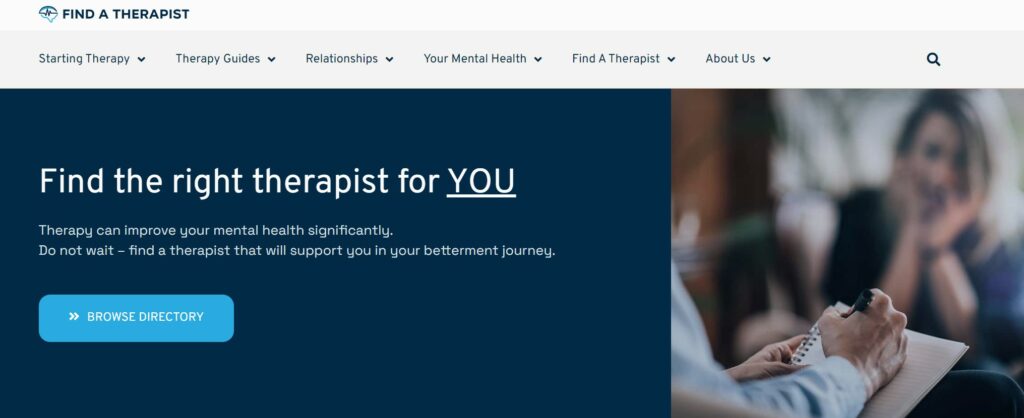
- Good for: Finding and contacting the right therapist for you.
- Location: Online and in-person therapy.
- Pricing: Varies depending on the counselor fee.
- Features: Filter your search, find accessible and effective online and in-person therapy, find guides on different types of therapy.
Find-a-therapist.com offers a therapist directory on their website. There you can customize your search according to different categories or keywords. Once you check the therapist’s profiles and select the one for you, you can contact them directly.
4. Online-therapy.com
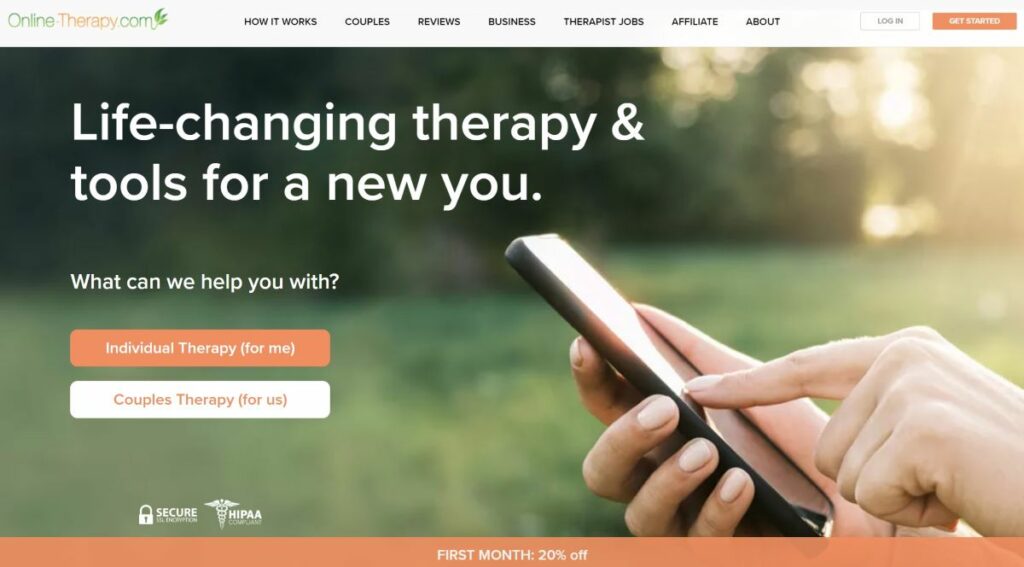
Discover transformative online therapy with Online-therapy.com. Through cognitive behavioral therapy (CBT), Online-therapy.com offers individual and couples support starting at $45/week. Engage in sessions via video, voice, or text for maximum flexibility. Fill out their online questionnaire to get started.
- Good for: Finding licensed and experienced therapists with a Cognitive Behavioral Therapy (CBT) approach.
- Location: Online therapy.
- Pricing: $40/week to $88/week (including our 20% discount first month).
- Features: Unlimited messaging with your therapist, including a daily journal and activity plan, yoga and meditation videos, and tests to see your progress.
Online-therapy.com offers mental health services with a Cognitive Behavioral Therapy approach. This approach is very useful for addressing body dysmorphia due to its emphasis on identifying and modifying negative thinking and behavioral patterns.
Read our online-therapy.com review here.
5. TalkSpace

Tailored to individuals, couples, teens, and offering psychiatry services, Talkspace plans kick off at a wallet-friendly $69 per week. What’s more, many health insurances also cover their services, enhancing accessibility and affordability. Complete a questionnaire and get matched with the right therapist for you.
- Good for: Depression, anxiety, bipolar disorder, OCD, PTSD, LGBTQIA+ therapy.
- Location: Online therapy.
- Pricing: Varies according to insurance coverage or self-pay options.
- Features: Accepts insurance, pick your therapist from a list of recommendations, live video sessions and unlimited messaging with your therapist, medication management.
TalkSpace is an online platform where you will be matched with the right body dysmorphia therapist for you. On TalkSpace you can also find medication management in case your treatment plan requires this approach.
Read our TalkSpace review here.
6. International OCD Foundation
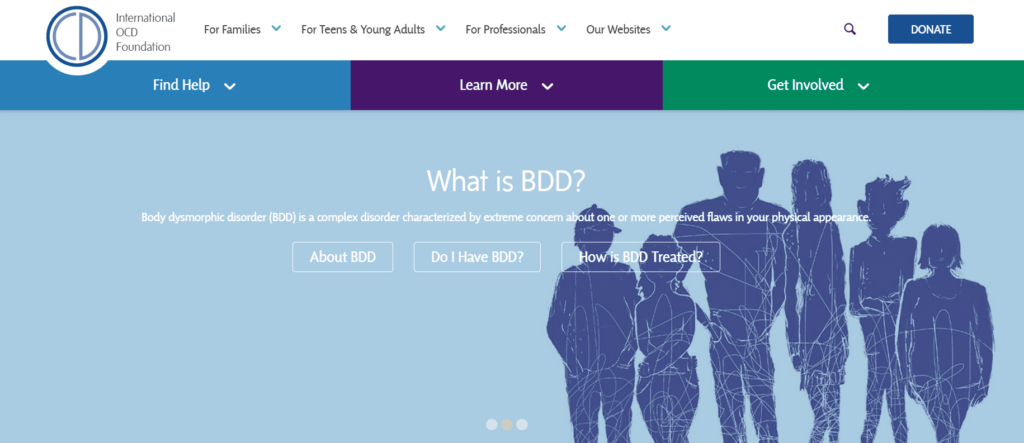
- Good for: Finding the right body dysmorphia therapist for you.
- Location: Online and in-person therapy.
- Pricing: Varies depending on the counselor fee.
- Features: General psychoeducation, find support groups or clinical programs for body dysmorphia, filter your search.
The International OCD Foundation serves as an online therapist directory and psychoeducation platform for the treatment of body dysmorphic disorder, as well as other obsessive-compulsive disorders. Once you choose your preferences, you will see a list of therapists best suitable for your needs, their address and contact information, and their biography.
What is Body Dysmorphic Disorder?
Body dysmorphic disorder (BDD), sometimes simply called body dysmorphia, is a mental health disorder categorized under obsessive-compulsive disorders in DSM-5 – the publication that classifies mental health conditions recognized in the United States.
BDD is characterized by extreme anxiety over a perceived, usually minor or even imagined, physical defect. The person usually has a distorted view of the flaw, meaning that they perceive it as more extreme than it is in reality.
The person suffering from BDD becomes so preoccupied with the perceived defect that it affects their social and work life, and damages their overall functioning. The person then tries to correct the defect by indulging in compulsive behaviors, such as excessive plastic surgery.
Some of the symptoms of body dysmorphic disorder are:
- The inability to stop thinking about physical flaws
- Extreme anxiety when thinking about your body
- Emotional distress or harmful behavior
- Alienating yourself from other people out of fear that they will see your flaw
- Ritualistic behaviors aimed at covering or hiding the flaws
- Repeated plastic surgery
It is important to note that no one likes everything about their bodies – we all look at ourselves and sometimes see flaws. The difference between normal thoughts about appearance and body dysmorphic disorder lies in the intensity and intrusiveness of those thoughts.
People suffering from body dysmorphic disorder cannot stop thinking about their perceived physical defect – the levels of anxiety they are experiencing disable normal functioning, and the disorder slowly takes over all parts of their life.
Types of Body Dysmorphia
While the diagnosis of BDD encompasses a broad range of appearance concerns, individuals may experience variations in the specific focus of their preoccupation.
This section will delve into the subtypes or variations of body dysmorphia.
Muscle Dysmorphia
Muscle dysmorphia, also known as “bigorexia” or “reverse anorexia,” is a subtype of body dysmorphic disorder (BDD) characterized by an obsessive preoccupation with muscularity and body size.
Individuals with muscle dysmorphia typically perceive themselves as inadequately muscular or underdeveloped, despite evidence to the contrary. They may experience distressing thoughts and feelings related to their perceived lack of muscle mass, leading to significant psychological and emotional distress.
People with muscle dysmorphia often engage in a range of maladaptive behaviors aimed at increasing muscle size and achieving an idealized physique. These behaviors may include:
- Excessive weightlifting and strength training
- Strict dietary regimens
- Steroid or supplement use
- Mirror checking and body comparison
- Avoidance of social situations
Body Dysmorphic Disorder by Proxy
Body dysmorphic disorder is a condition in which an individual obsessively fixates on perceived flaws or defects in another person’s appearance, typically someone they are close to, such as a partner.
This fixation leads to significant distress and impairment in daily functioning for both the individual with BDD by proxy and the person whose appearance is the focus of concern.
In body dysmorphic disorder by proxy, the affected individual may constantly scrutinize and criticize the appearance of the person they care about, often insisting that the perceived flaws are severe or disfiguring, even if others do not see them as such.
Body dysmorphic disorder by proxy can have significant negative consequences for both the individual with the condition and the person whose appearance is the focus of concern. It may strain relationships, lead to unnecessary medical procedures or interventions, and contribute to emotional distress and psychological difficulties.
Types of Body Dysmorphia Therapists
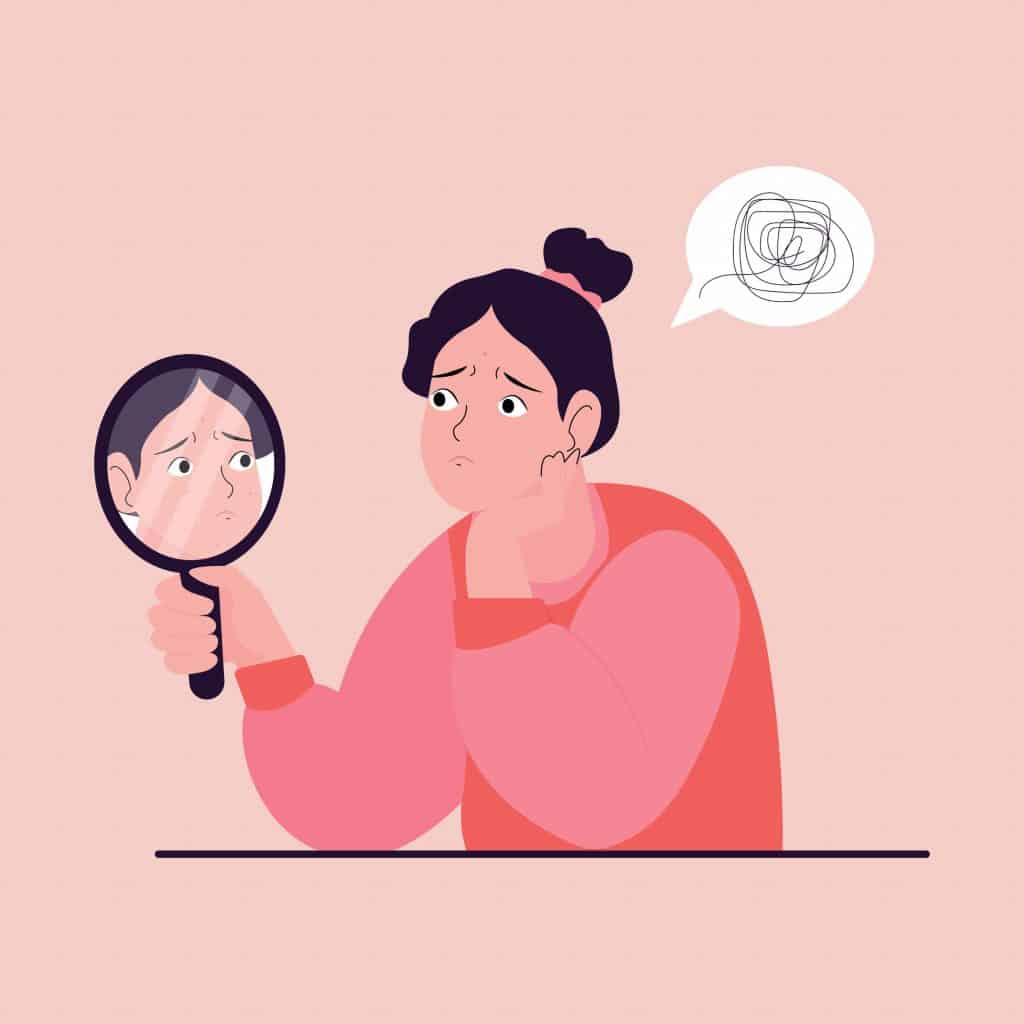
In this part of the article, we’ve looked at different credentials and qualifications you should look for when searching for a body dysmorphic disorder therapist.
Psychiatrists and Psychologists
Psychiatrists are mental health professionals with medical degrees. Just like psychologists, they can offer diagnosis and treatment, but unlike psychologists, they can also prescribe medication. Considering pharmacotherapy is oftentimes used to lessen the symptoms of body dysmorphic disorder, it can sometimes be useful to see a psychiatrist, especially if your condition is serious.
However, it’s important to note, both psychiatrists and psychologists have to obtain a certification to offer specific body dysmorphic disorder treatment, such as Cognitive-Behavioral Therapy. It’s always useful to check the therapist’s credentials before undergoing treatment.
Licensed Professional Counselors (LPCs)
These professionals are trained to treat people suffering from different kinds of mental health disorders, and usually have a master’s degree in counseling.
They can also be trained to treat specific disorders, such as body dysmorphic disorders. In this case, the therapist needs to have completed specific training pertaining to this disorder, such as that offered by the IOCDF.
Licensed Marriage and Family Therapists (LMFTs)
If a licensed marriage and family therapist obtains the right training and certifications for treating body dysmorphic disorder, they can greatly help with the family dynamics involved in this condition.
Severe cases of body dysmorphic disorder need a strong familial bond and support to get through the difficult process of beginning treatment. Licensed marriage and family therapists can educate family members on how to behave, what to expect and how to help you through the process of getting treatment.
Even though offering cognitive-behavioral or exposure and response prevention therapies require additional training, licensed therapists who haven’t been trained on these specific types of therapies can still offer talk therapy and support.
Can Body Dysmorphia be Cured?

Just like other obsessive-compulsive disorders, body dysmorphic disorder is chronic. However, its symptoms can be brought to a minimum with therapy and discipline.
The symptoms will most likely reappear during stressful periods, but there’s no reason they should continue to impair your quality of life. For example, in Cognitive-Behavioral Therapy or exposure and response prevention therapy, you can learn strategies that will help keep the condition under control.
If you feel like the condition is slipping out of hand, the best thing would be to contact your therapist again and get more support as soon as possible.
Types of Body Dysmorphic Disorder Therapies
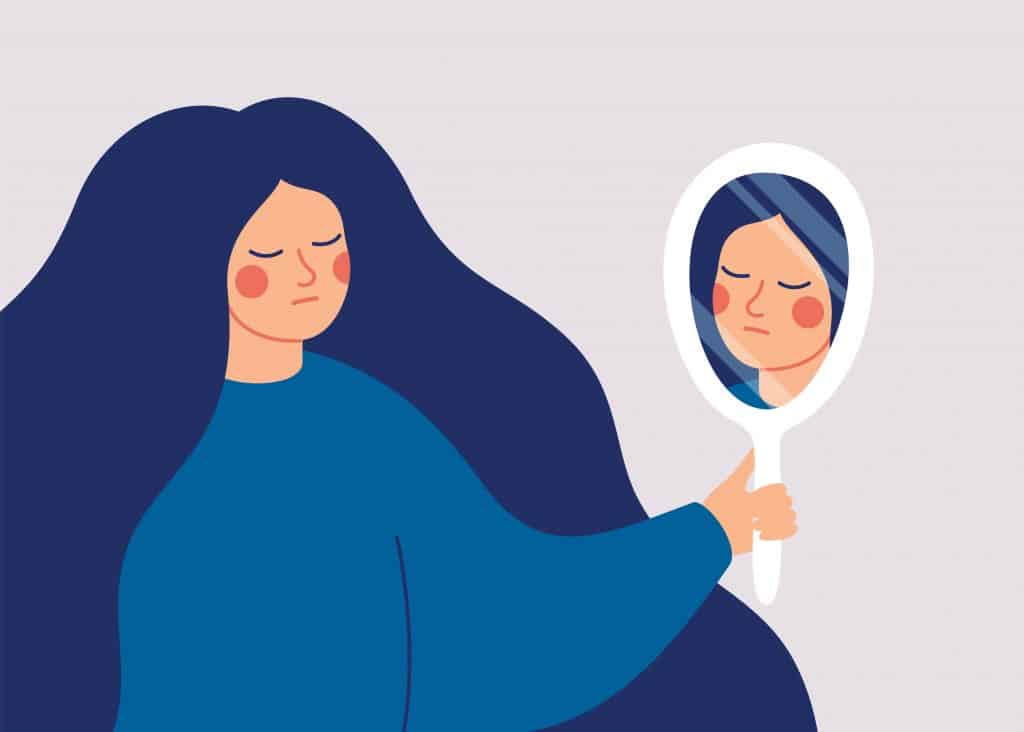
In this part of the article, we’ve looked at different types of therapies used to treat body dysmorphic disorder.
Cognitive-Behavioral Therapy (CBT)
Cognitive-Behavioral Therapy has been proven as one of the most effective therapeutic approaches when treating different types of obsessive-compulsive disorders, including body dysmorphic disorder.
Body dysmorphic disorder is rooted in negative thought patterns which distort the person’s perception of themselves. Some of these cognitive distortions include:
- Intrusive thoughts – a person suffering from body dysmorphic disorder can think about their appearance or perceived physical flaws for hours. These thoughts are defined as intrusive because they emerge on their own and the person has no control over them.
- Referential thinking – this type of thinking involves a false belief that other people notice the person’s flaw and focus solely on it. For example, “everyone is staring at my huge nose” is referential thinking.
- “All or nothing” thinking – thinking in extremes. For example, “my huge nose is making me look absolutely disgusting”.
- Mind-reading – this is a type of thinking where you assume someone else’s thoughts. For example, “my girlfriend thinks my nose is huge and doesn’t want to be with me anymore”.
Cognitive-Behavioral Therapy aims to change these negative thought patterns and replace them with healthier, more realistic ones.
At the beginning of CBT treatment, your therapist will first assess your symptoms and the severity of the disorder. During these initial phases, you can expect to answer some questions about the disorder and other aspects of your life.
Then, the therapist will offer psychoeducation about the disorder. You will learn about the nature of BDD, what causes it, and its prevalence and outcomes.
The therapist will then use different techniques, such as cognitive restructuring, exposure therapy, and ritual prevention to establish healthier thought patterns, prevent intrusive thoughts, and treat your compulsions.
Exposure and Response Prevention (ERP)
The goal of exposure and response prevention therapy is to stop the obsessive thoughts associated with body dysmorphic disorder, prevent compulsions, and ultimately lower the patient’s anxiety.
In exposure and response prevention therapy, your therapist will encourage you to let obsessive thoughts occur without reacting to them, or “putting them right” with compulsions.
For example, a person suffering from BDD might think they have too much acne and might use extensive amounts of makeup to hide it. In this case, the obsession is the thoughts about these imperfections, which can cause extreme anxiety. Putting on makeup and covering the imperfections is a compulsion, which serves to lower anxiety.
Exposure and response prevention therapy will work on lowering the patient’s anxiety gradually, starting from easier-to-treat behaviors, and working up towards addressing more difficult ones.
Pharmacotherapy
Even though there is no pharmaceutical cure for body dysmorphic disorders, pharmacotherapy can sometimes be prescribed to treat co-occurring or comorbid disorders, like eating disorders or major depression.
Pharmacotherapy can also be prescribed to treat symptoms of body dysmorphic disorder, such as anxiety, depression, or insomnia. In this case, the most common antidepressant prescribed is selective serotonin reuptake inhibitor (SSRI).
If you think you might need pharmaceutical medication, you should contact your doctor or your psychiatrist so they can assess your condition. If they find that medication could be helpful for you, they can suggest specific drugs and prescribe them to you.
Conclusion
When left untreated, body dysmorphic disorder can cause extreme distress and anxiety, become more severe over time, and severely damage your quality of life. There are many treatment options for body dysmorphic disorder, including face-to-face or online therapy.
If you’re still not sure how to find the right body dysmorphic disorder therapist, contact us and we’ll get back to you.
References
Cororve, M. B., & Gleaves, D. H. (2022). Body dysmorphic disorder: a review of conceptualizations, assessment, and treatment strategies. Obsessive-Compulsive Disorder and Tourette’s Syndrome, 13-34. Link.
Veale, D. (2004). Body dysmorphic disorder. Postgraduate medical journal, 80(940), 67-71. Link.
Weingarden, H., Marques, L., Fang, A., LeBlanc, N., Buhlmann, U., Phillips, K. A., & Wilhelm, S. (2011). Culturally adapted cognitive behavioral therapy for body dysmorphic disorder: case examples. International journal of cognitive therapy, 4(4), 381-396. Link.






